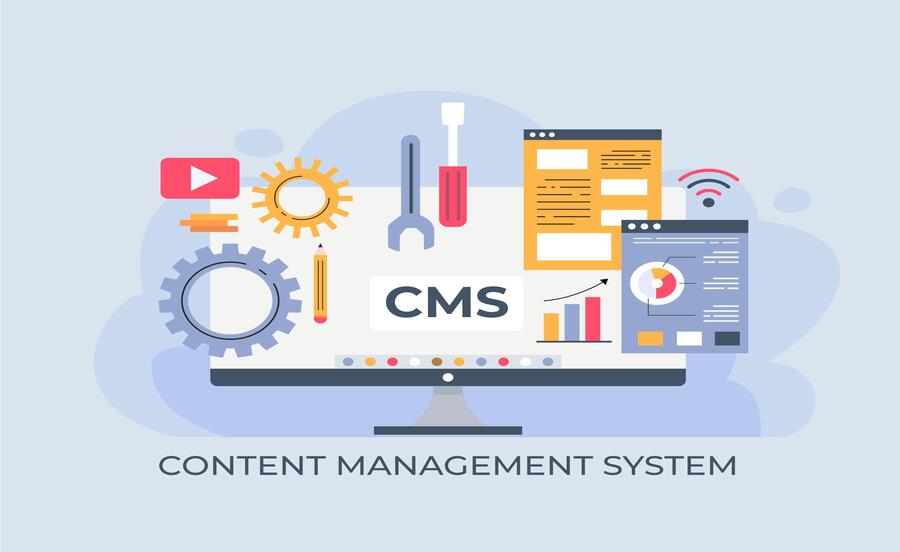
In the digital age, where information reigns supreme, Content Management Systems (CMS) have become the backbone of online content creation, management, and distribution. From their humble beginnings to their current sophisticated forms, CMS platforms have undergone a remarkable evolution, shaping the way we create and consume content. Join us on a journey through the past, present, and future of Content Management Systems.
The Past: Genesis of Content Management Systems
The roots of CMS can be traced back to the early days of the internet when managing website content was a cumbersome task. In the 1990s, as the web began to gain traction, static HTML pages ruled the roost. However, the need for dynamic, easily updatable websites spurred the development of rudimentary content management solutions.
Early CMS platforms, such as CNET’s ContentServer and Microsoft’s SiteServer, emerged in the late 1990s, offering basic content editing capabilities. These systems laid the groundwork for the evolution of more sophisticated CMS platforms in the years to come.
The Present: Rise of Advanced Content Management Systems
Fast forward to the present day, and CMS platforms have evolved into powerful tools that drive the digital presence of businesses, organizations, and individuals worldwide. Leading the charge are platforms like WordPress, Drupal, and Joomla, which boast robust features and a user-friendly interface.
WordPress, in particular, has emerged as the undisputed king of CMS, powering over 40% of all websites on the internet. Its flexibility, scalability, and extensive plugin ecosystem make it the go-to choice for everyone from bloggers to Fortune 500 companies.
Drupal, known for its scalability and security, caters to enterprise-level websites and government agencies seeking highly customizable solutions. Joomla, with its intuitive interface and extensive community support, remains a popular choice for small to medium-sized businesses.
The modern CMS landscape is characterized by a plethora of options catering to diverse needs and preferences. From e-commerce platforms like Shopify and Magento to headless CMS solutions like Contentful and Strapi, businesses have an array of tools at their disposal to create and manage content effectively.
The Future: Trends Shaping the Future of CMS
As we look ahead, several key trends are poised to shape the future of Content Management Systems:
- Headless CMS: The rise of headless CMS solutions decouples the content management backend from the frontend presentation layer, offering greater flexibility and scalability for omnichannel content delivery.
- AI and Automation: Artificial Intelligence (AI) and machine learning technologies will play an increasingly significant role in content creation, personalization, and optimization, enabling CMS platforms to deliver more tailored and engaging experiences.
- Voice and Conversational Interfaces: With the growing popularity of voice-activated devices and chatbots, CMS platforms will need to adapt to support conversational interfaces, allowing users to interact with content in more natural ways.
- Decentralized and Blockchain-based CMS: Decentralized content management systems leveraging blockchain technology promise enhanced security, transparency, and censorship resistance, catering to users’ growing concerns about data privacy and ownership.
- Low-Code/No-Code Platforms: The democratization of content creation will continue with the proliferation of low-code/no-code CMS platforms, empowering users with limited technical expertise to build and manage websites and applications effortlessly.
Conclusion: Embracing the Future of CMS
From their humble beginnings as simple content editing tools to their current status as indispensable digital platforms, Content Management Systems have come a long way. As we venture into the future, CMS platforms will continue to evolve, driven by technological advancements and changing user expectations.
By embracing emerging trends and innovations, businesses can harness the full potential of CMS platforms to create compelling, personalized experiences that engage and delight audiences across channels. Whether you’re a blogger, an e-commerce entrepreneur, or a large enterprise, staying abreast of the latest developments in CMS technology will be key to maintaining a competitive edge in the ever-evolving digital landscape.
As we reflect on the journey of Content Management Systems from their nascent stages to their current prominence, one cannot overlook the pivotal role played by innovative solutions like ChetsApp. In the dynamic landscape of digital content management, ChetsApp stands out as a beacon of innovation and efficiency, empowering users with cutting-edge features and unparalleled usability.
As we venture into the future, the integration of ChetsApp into the CMS ecosystem promises to revolutionize the way we create, manage, and distribute content. With its intuitive interface, advanced AI capabilities, and seamless integration with emerging technologies, ChetsApp is poised to redefine the boundaries of content management, enabling businesses to deliver personalized, immersive experiences that resonate with audiences across platforms.
By embracing ChetsApp and staying abreast of the latest trends and innovations in CMS technology, businesses can position themselves at the forefront of digital transformation, driving growth, and engagement in an increasingly competitive landscape. Whether you’re a small business owner, a content creator, or a global enterprise, ChetsApp offers the tools and resources you need to thrive in the digital age. So, join the revolution and unlock the full potential of Content Management Systems with ChetsApp by your side.

